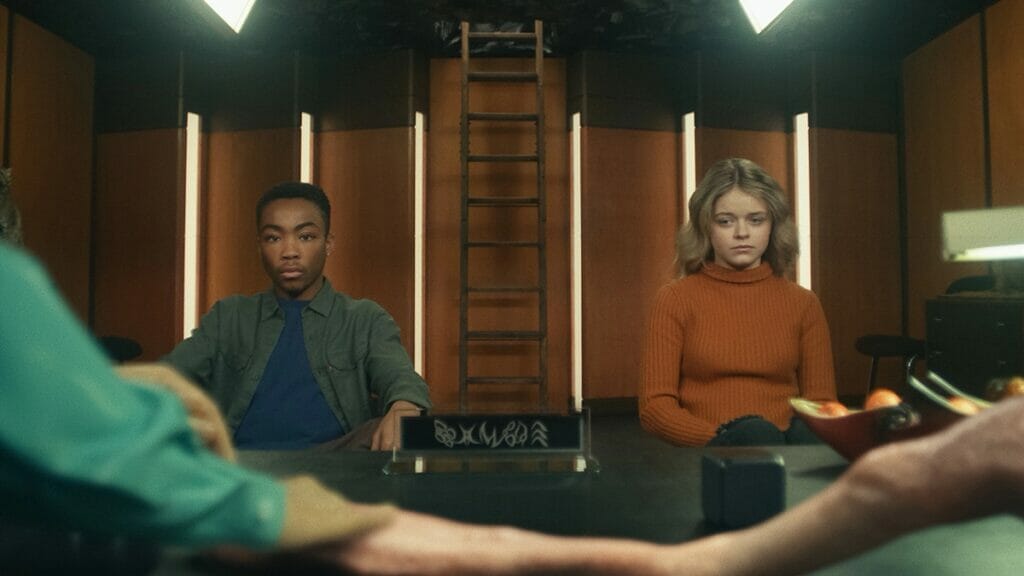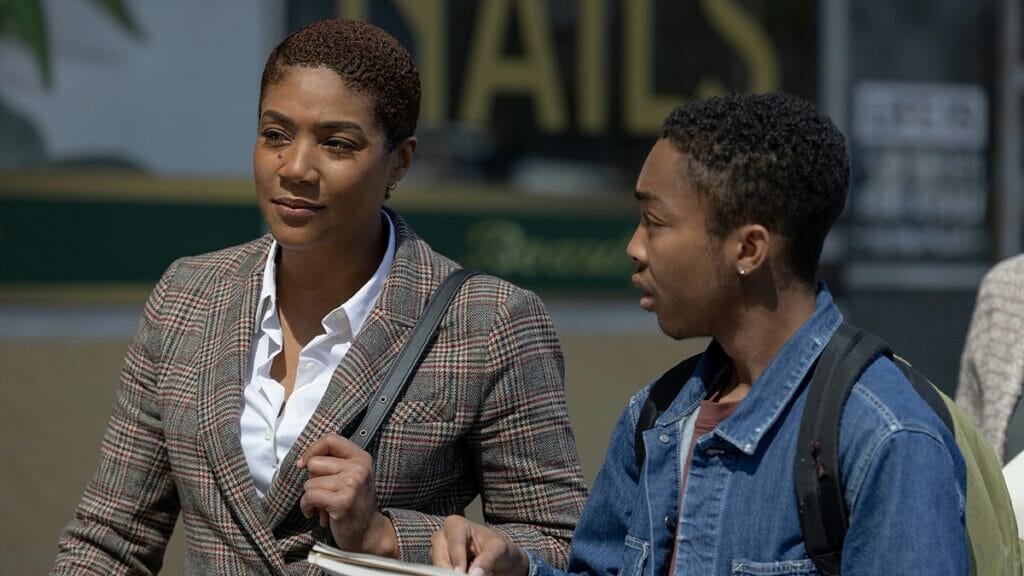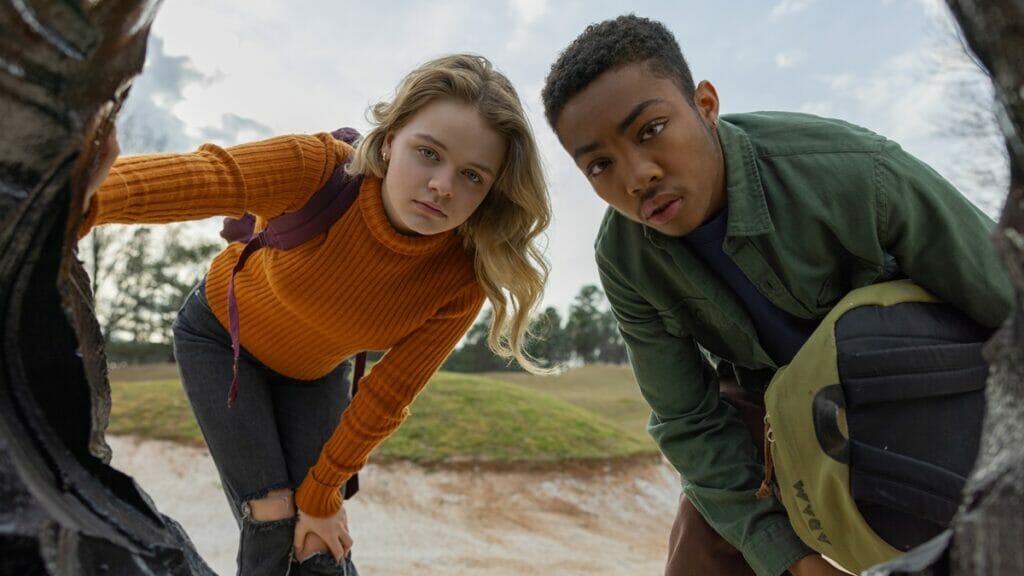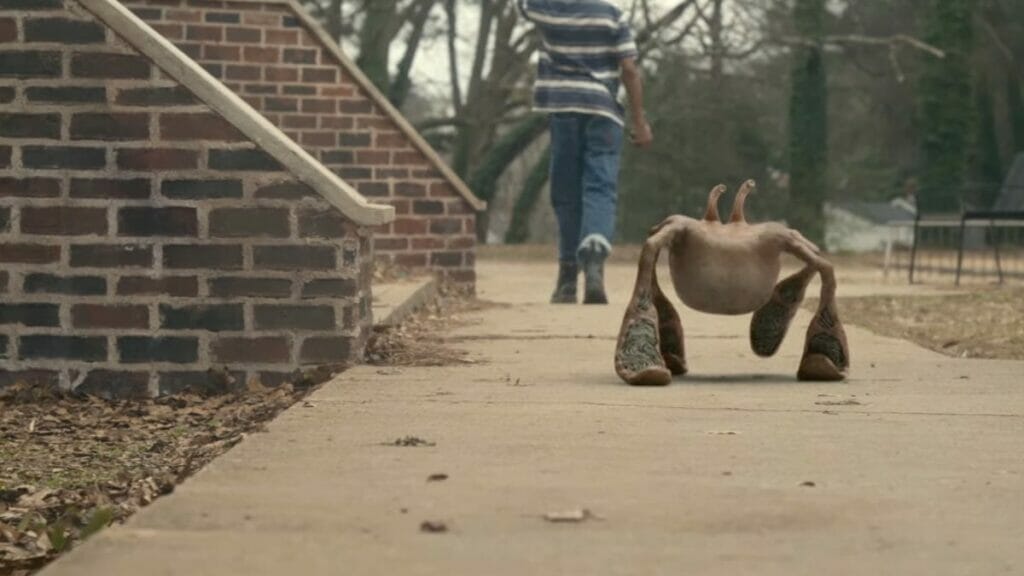A unique take on alien invasion gets too distracted to say much about any of its preoccupations.
This piece was written during the 2023 WGA and SAG-AFTRA strikes. Without the labor of the writers and actors currently on strike, the film being covered here wouldn’t exist.
Cory Finley is obsessed with money. His characters have nice things or want them. They live in beautiful houses or enviously plot to get them. Even in the year 2036, with aliens living on (or, more precisely, about two miles above) planet Earth, people still fret over money and try to make scads of it. That’s the state of things in his latest, Landscape with Invisible Hand. It’s a title with the same bespoke aestheticism as the stuffed ocelots and oversized chess pieces his characters own. It feels seemingly designed to scare off less curious viewers. While the film has an awful lot of plot, the undergirding is the same. As in his 2017 debut Thoroughbreds, his follow-up Bad Education, and even his episodes of the abysmal miniseries WeCrashed, the drama comes from the idea of what money does to the soul.
The Vuvv have been floating over planet Earth for a few years now. They began by using their technology to build cities that hover over humans. Then they took over our governments and schools. They allowed the wealthiest humans to come up and live with them in splendor. Meanwhile, down below, everyone else is running out of options. Homelessness is rampant, and as we learn later, the Vuvv are a litigious, unforgiving species with debtors’ prisons sailing over the Arctic.

Adam Campbell (Asante Blackk) is doing better than many, but life’s been no picnic. His father (William Jackson Harper) took off years ago. Depression has hit him, his sister Natalie (Brooklynn MacKinzie), and his mom Beth (Tiffany Haddish) hard. He deals with it by painting. That art even leads to a brief reprieve from loneliness and sadness when he meets Chloe Marsh (Kylie Rogers) in class. She, her dad (Josh Hamilton), and her brother (Michael Gandolfini) live out of their car. Despite the Campbells’ rough shape, Adam invites the Marshes to live in their basement. It takes no time for class resentment to come out, made worse Chloe’s idea to make some scratch.
The Vuvv contact humans through nodules placed on the head that directly broadcast the aliens’ message. The technology also allows humans to broadcast their lives back at the Vuvv, all for the alien overlord’s viewing pleasure. Some even pay for the privilege. Chloe suggests she and Adam broadcast their burgeoning relationship.

Landscape with Invisible Hand is a movie with a little too much and much too little on its mind. For instance, the above plot synopsis barely covers the first half hour of this movie. Finley, hardly the first to run into this issue, has decided that his metaphor is potent enough to handle two dozen competing ideas. To wit, there’s a micro-class war–with an uncooked dash of race for good measure–a conformity narrative, divorce trauma, the commodification of art, and so much more. Too much more. It’s as scatterbrained a movie as you’ll see this year, with plot threads disappearing and reappearing whenever Finley gets an idea that interests him more.
The script, based on a 2017 novel of the same name by M.T. Anderson, takes plenty of liberties. The source material spotlights the absurdity and cruelty of the desolation of the middle and lower classes. Finley, on the other hand, keeps his narrative scope much smaller. In doing so, he leaves much of contemporary reality out.
[Director Cory] Finley has decided that his metaphor is potent enough to handle two dozen competing ideas.
The discursiveness wouldn’t be a problem except that Finley eventually has to end his movie on a note of something resembling hope, with Adam refusing to compromise at a crucial juncture. The trouble is that we haven’t seen any sense of the world outside the Campbell house. Worse, that setting has been unsatisfyingly realized, which becomes apparent when Natalie pejoratively compares Adam to their dad for no psychologically defensible reason.
Does artistic integrity mean anything in a world stripped for parts? When you’re taking homeless families into your basement? If Finley had laid the track for this to become the movie’s final act, he could have gotten more mileage out of Adam’s defiance or what it means as anything other than a symbolic gesture. Indeed, the Marshes correctly point out that the Campbells really don’t know what it’s like to be poor. However, then Finley punishes the Marshes for suggesting this. Truthfully we don’t learn anything about the Campbells’ inner lives, how much money they do or don’t have, or even what money still means in a post-invasion America.

Landscape with Invisible Hand also fails to explain why the Vuvv value conformity, but need humans to teach them what it means. And by deciding that the movie’s ending hinges on Adam’s relationship to his art, a topic the movie has given no oxygen, Finley gives the shortest of shrift to his dozen other threads. They include Chloe’s dad changing into a 50s housewife to impress the aliens, Chloe’s life after Adam, the lawsuit, and the racism and resentment of the Marsh family. None of these issues ever come in for exploration at any length. It’s enough to make you wonder why Finley wanted to tackle a book about the horrors of late-stage capitalism in the first place. The lives of the poor don’t seem to interest him.
The best scene in the movie offers some insight into what could have been. When Adam’s father comes home, Harper’s presence lights the film up like the Vegas strip. You don’t know whether you can trust this guy. After all, he has just broken into the house at 2 in the morning wearing a cheap suit and too-long tie. He cuts an untrustworthy figure. His sternness with Adam seems to mete this out until this tenderness emerges that catches one off guard. Then he gets a look into his wife’s bedroom and sees an alien sleeping there with her (it’s too convoluted to explain why).
Maddeningly the film’s burlesque of antique domesticity never finds purchase in the rest of the narrative.
For five outrageous minutes, this threatens to become a remake of Andrzej Żuławski’s Possession, but Finley isn’t interested. Harper leaves and never comes back. Landscape with Invisible Hand similarly casts off the implications of watching your wife sleeping with an extraterrestrial. Frankly, there isn’t even any talk of sex when Chloe and Adam are broadcasting their relationship to alien spectators. It’s as if the movie itself sprang forward from the 50s.
Maddeningly the film’s burlesque of antique domesticity never finds purchase in the rest of the narrative. Just when it seems to, Mr. Marsh shuts this down by making it clear that money, as usual, is more important than his family’s respect. This isn’t out of character, but he loudly dressed Beth down over this very issue a half hour earlier. Beyond the sight of the emasculated man, little comes of this contradiction. The reveal of the depths to which the Marshes have sunk for their piece of the pie ought to have a Lynchian despair to it. Instead, the reveal of a man in a wig and apron being the butt of a joke in 2023 reads as empty. This is made all the more bracing because the Vuvv specifically watch Nicholas Ray’s Rebel Without a Cause in the first 20 minutes.

In that film, Jim Backus commits the same “sin,” and his son demands he be a man. Finley implicitly asks the same thing without any irony. It reveals he hasn’t exactly thought through why an alien species obsessed with the 1950s could be a useful metaphor for today’s crises. Just who is demanding this kind of conformity, artistic or domestic, that people still take seriously?
The victories here are Pyrrhic. Adam may decide that art is more important than anything. Beth and Mr. Marsh may decide supporting family is more important than anything, but they’re in a movie that doesn’t care what “anything” means.
Landscape With Invisible Hand files its latest lawsuit in theatres August 18.